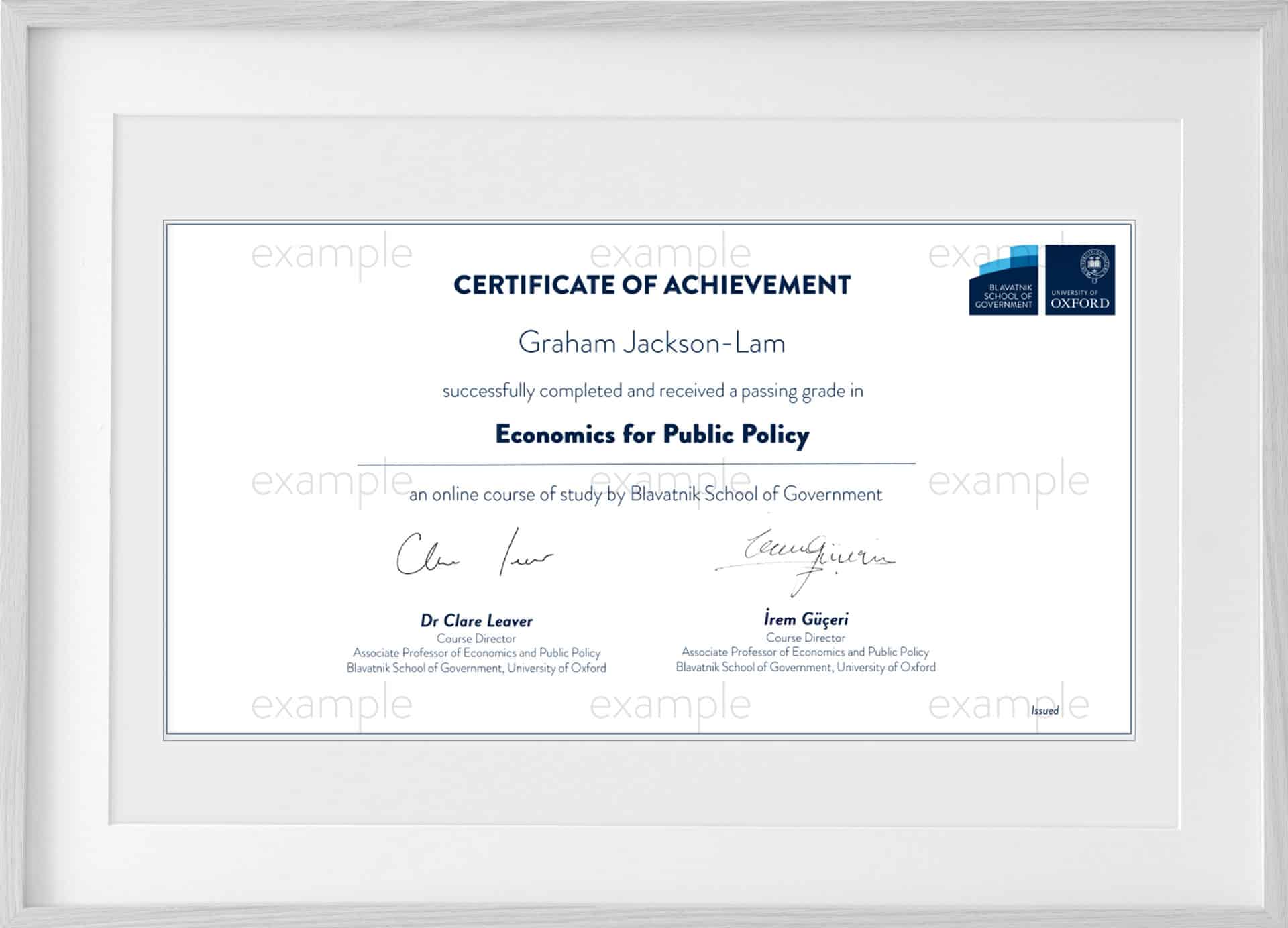In this module, you will introduce yourself to your cohort and meet the Facilitator who will support you throughout the course. You will learn more about what the course offers and how to navigate the learning platform.
If you are working within public policy, it is highly likely that you will come across professional economists and their reports. This course aims to prepare you for these interactions by introducing you to the language and concepts of economics for public policy and by encouraging you to become a critical consumer of economic analysis.
You will learn about what markets can achieve, why they sometimes fail, and what governments can do in response. You will also explore how governments can raise revenue through taxation and alleviate shocks to the macro economy.
Economics for Public Policy is certified by CPD UK’s (Continuing Professional Development) Certification Service.
Find out how you could complement the skills built on this course with those developed on another. Discover our government and public policy multi-course pathway and discounts.
Duration
8 weeks (3-5 hours of study per week recommended)
Intakes
February, May, August, October
Next start date
2 August 2025 (deadline 1pm (GMT) on 1 August 2025)
Fees
£1740 (inclusive of VAT)*
*Discounts are available to alumni, those working in the public sector and certain geographical regions. Register your interest to learn more.
Location
Online
Award
Certificate of completion

Requirements
This online course is designed for those who wish to enhance their understanding of how economics concepts can be applied to public policy.
This course is for you if:
- you are an early-to-mid-career civil servant wanting to move into a specialist or management position;
- you are an experienced professional in a strategic position wanting to update your formal knowledge and equip yourself with the tools needed to remain effective and current;
- you work for an NGO or government organisation, and you want to interact more effectively with policymaking in your day-to-day work.
There are no specific entry requirements for this course. However, please be aware that it is a master’s level course, so will take a certain level of commitment. Learners are expected to dedicate 3-5 hours a week to their studies, with all activities and tasks taking place online.
About the course
On this eight-week online short course, you will explore some foundational principles of economics and learn how to apply economic theory in a policy formulation context.
You will learn about what markets can achieve, why they sometimes fail, and what governments can do in response. You will also explore how governments can raise revenue through taxation and alleviate shocks to the macro economy.
All your course content, tasks and activities will be accessed online, giving you the opportunity to learn from Oxford University academics, and gain a public policy qualification, from wherever you are in the world.
Watch the one-minute video below for an overview of the course.
“I was able to broaden my knowledge and skills beyond the technical, especially on designing and implementing programs that are efficient, effective, and evidence-based. Through the course, I have the gained competencies that will enable me to communicate economic concepts, feasibility and analysis to stakeholders in a clear and understandable manner.”

Oyinlola Adewoyin, Chief Engineer at the Lagos State Ministry of Works and Infrastructure

Course outcomes
On this online course, you can expect to learn the language and concepts of economics for public policy, including about ‘mainstream economics’, economic rationale for government intervention and the financial challenges of public policy. You will also receive a certificate to support your career progression. See our full learning outcomes section for more detailed information.
This programme is also certified by CPD UK. Learners will be able to request their CPD certificate after successfully finishing the course, using their certificate of completion as proof of eligibility. The course has an estimated 40 hours of learning, equating to 40 CPD points.
Upon completion of the course, you will receive a certificate that will support your career progression and enhance your resume. You will have developed practical skills and solutions that you can take into your workplace, where they will have an immediate impact on your organisation. This programme is also certified by CPD UK.
Note, the onus is on students to request these CPD certificates at the end of their studies. The University and its partners accept no responsibility, and cannot be held responsible, for the claiming or validation of hours or points.
On this online course, you can expect to achieve the following:
- Be able to explain what ‘mainstream economics’ is, identify relevant applications, and appreciate the limitations of this approach;
- understand the economic rationale for government intervention in a variety of global settings, and critically appraise specific policy responses;
- appreciate the challenges associated with the design and finance of public policy, both in theory and practice.
“It is a great opportunity to learn from one of the most prestigious centres of learning in the world, if the person can afford the fees and make time to study around their normal daily work and other engagements.”

Mobolaji Idowu, Project Manager at the Wildlife Conservation Society, Nigeria Program
Modules
You will study eight modules over the course of eight weeks. It is a collaborative learning process, week-by-week, so you will have ample opportunity to discuss key policy topics with your peers and a course Facilitator.
Activities will include set readings, reflection exercises, multiple-choice questions and discussion forums. Your Facilitator will guide you through these activities and provide feedback at each stage. These activities are not formally graded but you will need to participate in each to successfully complete the course and qualify for your certificate.
The final assessment, completed in module eight, will be your main summative assignment and marked by your Facilitator. Accompanying this in your final week will be a summative quiz. Altogether, the work you produce in your assessment week will be worth 50% of your final grade.
Faculty

Dr Clare Leaver
Professor of Economics and Public Policy
Dr Clare Leaver is Professor of Economics and Public Policy at the Blavatnik School of Government, and a Fellow of University College, Oxford. She studies careers and incentives in the public sector, with a focus on education sectors in low and middle-income countries. Clare is Research Coordinator for the Research on Improving Systems of Education (RISE) Programme, Co-Academic Director of DeliverEd, a research programme which seeks to build evidence on delivery approaches for learning reform, Co-Academic Director of the People in Government Lab, and a Fellow at CEPR. She holds a PhD from the University of Bristol.
“This is a great opportunity to delve into specific topics of relevance to your career and/or interest in an environment that is self-paced. It also enables one to develop, gain knowledge, be challenged, and enhance or build new skills in a premier institution with a renowned organisation.”

Dr Roni Ajao, Executive Director of a public sector consultancy in the UK
Enrol on the course today.
Request for information


